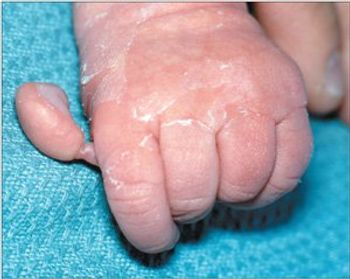
On Wednesday, the US House of Representatives passed an $819 economic stimulus bill, which includes billions of spending to better the lives of children.

On Wednesday, the US House of Representatives passed an $819 economic stimulus bill, which includes billions of spending to better the lives of children.

Topical Retinoids in the Treatment of Acne Supplement with Contemporary Pediatrics

After recommending deferring some Hib doses due to a shortage of the vaccine in 2007, the CDC recorded five new cases of invasive Hib disease in Minnesota.

The US Food & Drug Administration warns the public to refrain from consuming foods that contain peanut butter until the food in question is cleared of any link to the national salmonella outbreak.

The FDA is weighing approval of an investigational epilepsy drug for adults and children that has reportedly caused vision loss in certain patients.

The House of Representatives passed a bill Jan. 14 to renew and expand the State Children's Health Insurance Program (SCHIP).


Certain chemicals that children are exposed to in their first three months of life could cause increased body mass index (BMI), according to a new study.

Gym classes, fitness tests, and other forms of school-based physician education do not help students lose weight, a systematic Cochraine review found. But that?s okay.

Healthcare Leaders to Convene at the 8th Annual Forum for Improving Children?s Healthcare to Discuss Innovative Ways to Improve Children?s Healthcare Quality

Vicks VapoRub, a popular treatment choice for cough symptoms and congestion, may actually cause respiratory harm in infants and small children.

Cigarette smoking while pregnant is linked to probable detrimental changes in the mother's as well as the fetus' thyroid function, researchers reported...

Specific genetic mutations have been discovered that may point to a significant chance of relapse in children with acute lymphoblastic leukemia (ALL).

Healthcare Leaders to Convene at the 8th Annual Forum for Improving Children?s Healthcare to Discuss Innovative Ways to Improve Children?s Healthcare Quality

“My daughter [age 10 years] has been bullied at school for the past 2 years by another girl in her class. This girl dominates my daughter’s lunchtime and recess, controlling where she sits and who she plays with. She uses scare tactics such as loud outbursts and physical threats. I know this girl has a history of being neglected and abused by her parents, but still. . . . My daughter is absolutely miserable.

Two-year-old girl with asymmetry of leg size at birth; left leg is larger than right. The size discrepancy has remained relatively constant since birth, with no sudden change in overgrowth of the affected limb.

A review of the best software products for desktops, laptops, and palmtops/PDAs/iPhones.

In my exam room hangs a poster of diseases that have been significantly reduced through vaccination (eg, chicken pox, measles, polio)...

A review of the life of Virginia Apgar, MD, a pioneer in child health, who would have been 100 in 2009.

Links to information about common lab tests, which let patients and parents know what will happen to them.

Asthma investigators identified evidence-based clinical process measures that are appropriate, feasible, and reliable for assessing the quality of care provided to children hospitalized with asthma exacerbations.

Respiratory infections during the winter are old hat. But what you may be surprised to learn is the identity of the virus at hand, as a new lot of respiratory pathogens make a name for themselves.

Review of an article written 25 years ago about KD with a discussion of symptoms, research yet the cause still goes unanswered.

A 17-year-old teenager has developed fuzzy pale rings around several moles over the summer, the moles were present for years,possibly since birth. There is a family history of skin cancer.

The federal government is changing the recommendations for vaccinations: what should the new ones be, and how will the changes affect your practice?

A female infant is found to have mild grade one bilateral hydronephrosis and a nearly four centimeter cyst in the pelvis near the bladder

In the November 2008 pediatric hypertension article, I was surprised to see in the clinical case presentation that the child's blood pressure was not measured off of his methylphenidate, despite the data in Table 2.

EIC Julia McMillan discusses the last 25 years in pediatric medicine

This 2-week-old boy was born with well-formed extra digits on both hands and feet. The extra digits on the hands were attached by a narrow band of tissue to the lateral base of each little finger, and there were 6 toes on each foot. Radiographs showed synostoses of the fifth and sixth metatarsals of both feet. No other anomaly was apparent. The father’s paternal grandfather, greatgrandfather, and cousin also had extra digits at birth; however, none had involvement of all 4 extremities.

Sometimes they come in as phone calls (“Is it OK to breastfeed my baby when I have a cold?”), at other times during “may-I-talk-to-youfor-a-minute” sessions at the end of a scheduled visit (“She’s in kindergarten and still sucking her thumb . . .”). Whatever their mode of delivery, questions from parents take up a significant chunk of a pediatrician’s day.